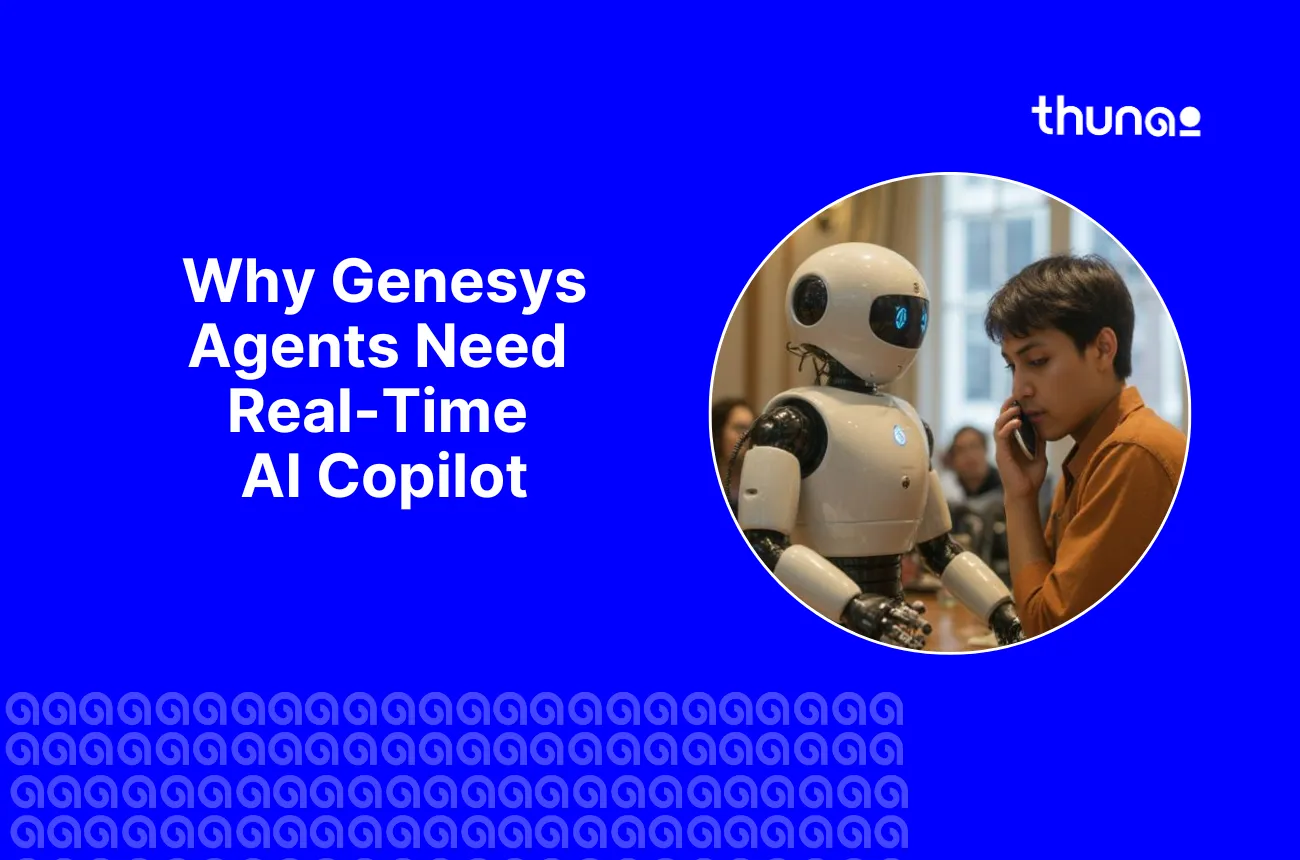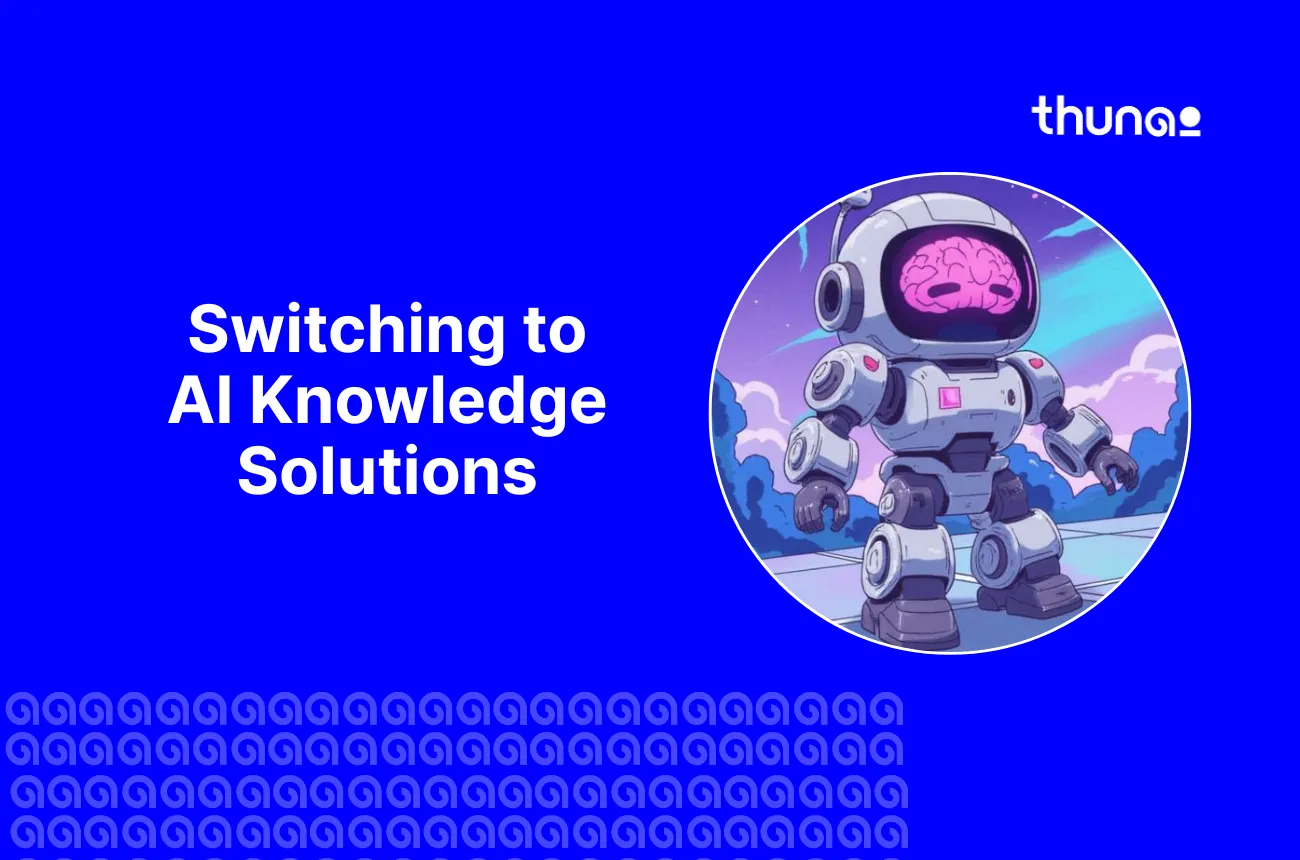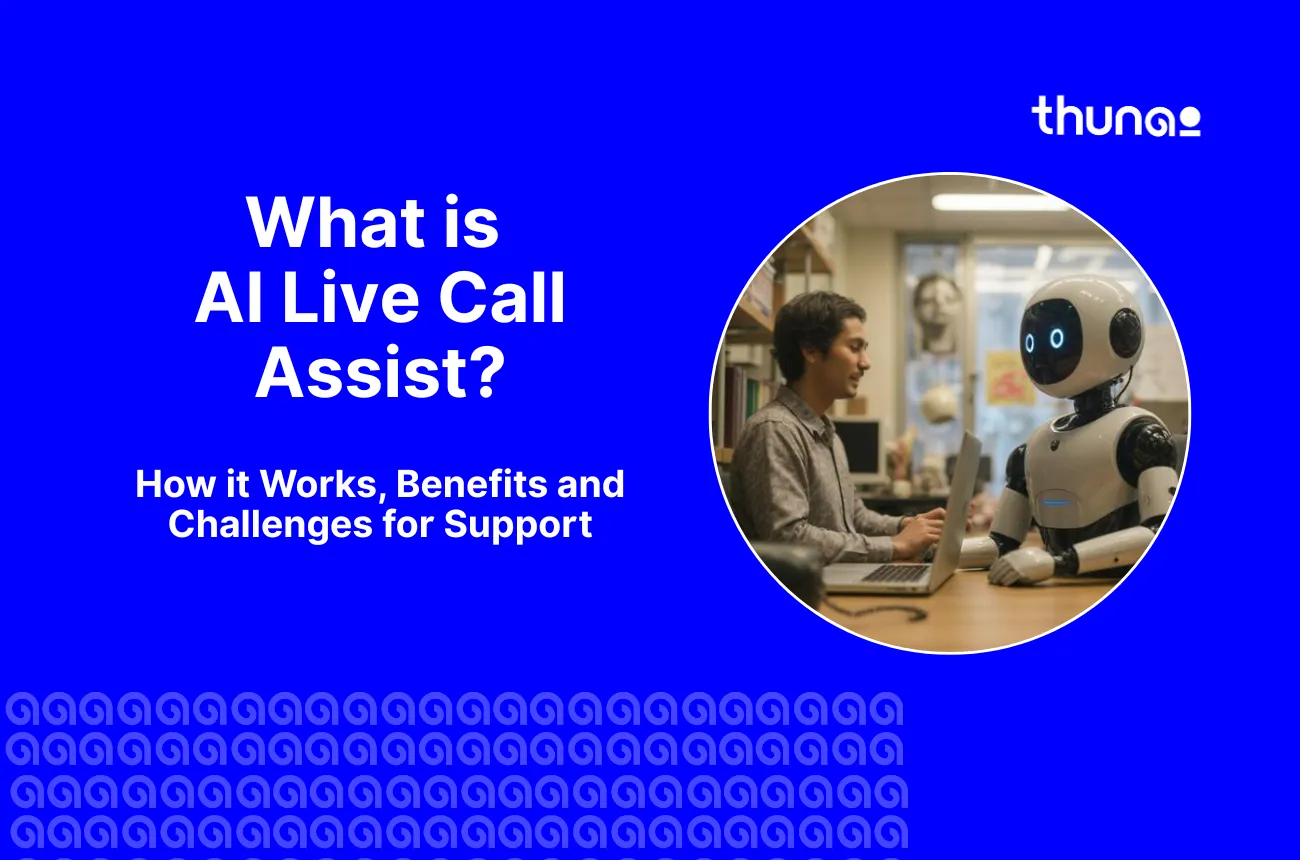10 Best Enterprise Contact Center Solutions in 2025 - Top Picks, Pros and Cons

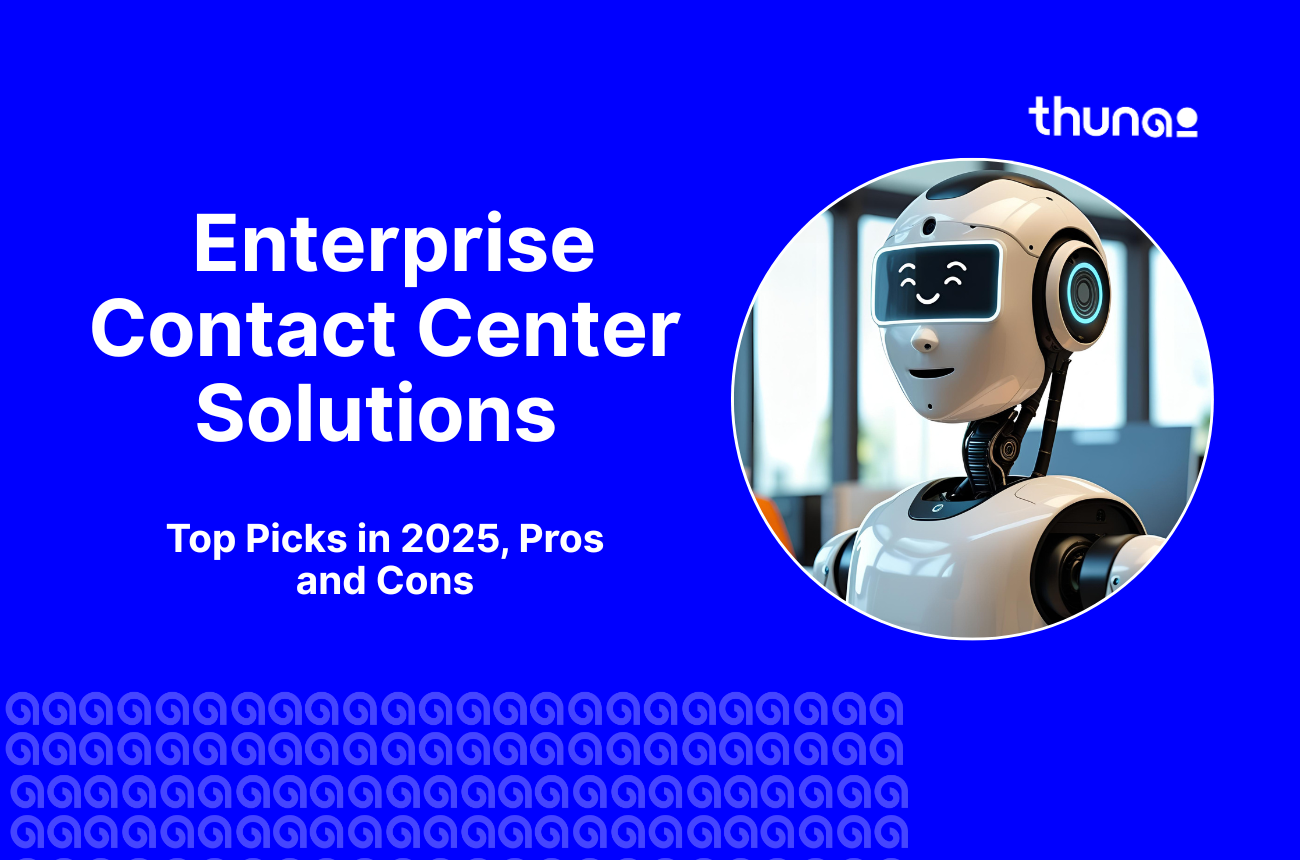

Thunai learns, listens, communicates, and automates workflows for your revenue generation team - Sales, Marketing and Customer Success.
TL;DR
Quick Summary
- Enterprise Contact Center is a strategic hub for managing the entire customer experience (CX), not just phone calls.
Top Contact Center Platforms at a Glance
- Thunai: Best for enterprises that want personalized AI-first automated replies + no-code AI voice, AI chat, and email agent contact center solutions.
- Amazon Connect: Good for teams already heavily invested in the AWS ecosystem.
- NICE CXone: Best for firms needing a stable software with strong workforce management tools.
- Genesys: Best for creating customer journeys across all channels.
Key Features to Look For
- Omnichannel Communication: A unified system to manage all customer interactions in one place.
- Artificial Intelligence (AI): Powers self-service bots, provides real-time assistance to human agents, and automates tasks like call summaries.
- Workforce Engagement Management (WEM): Tools for quality monitoring, AI-based staff scheduling, and performance tracking.
- Reporting and Analytics: Dashboards and reports to monitor agent performance and understand customer sentiment.
The world of customer service is changing at a fast pace.
You are likely looking for an enterprise contact center software that does more than just handle calls.
You need one that truly elevates your customer experience, makes operations more efficient, and helps drive growth.
To help with this, in this guide, we have done a deep dive into the top enterprise call center platforms available today. We looked into their features, strengths, and strategic aims.
Our goal is to give you a clear, hype-free look at the best enterprise contact center solutions for your company.
What is an Enterprise Contact Center?
An enterprise contact center is not just a department that answers phone calls anymore. The department has developed into a connected, AI-based center for all customer interactions. Modern enterprise call center solutions are different from old, separate call centers.
In enterprise contact center solutions, these journeys play out across many different channels. For instance, they include both voice and digital platforms. This big change has come about because of rapid advancements in artificial intelligence (AI), cloud computing, and data analytics.
Consequently, picking out the right enterprise contact center solution has become one of the most important technology decisions for operational efficiency, brand loyalty, and even revenue growth.

Main Features of Enterprise Contact Center Solutions
Modern enterprise contact center software is defined by a set of advanced features. These features are designed to improve both the customer experience and operational output. These central functions are what distinguish a real enterprise system from a simple business phone system.
- Omnichannel Support: The ability to deal with and route interactions from many channels is basic. These channels include voice, web chat, email, SMS, and social media. All are taken care of through a single agent desktop.
- AI and Automation: Artificial intelligence is now a central engine. This includes conversational AI bots for self-help. This also includes agent-assist tools that give real-time advice. The system also has sentiment analysis to read customer emotion and predictive routing to match customers with the best agent.
- Workforce Engagement Management (WEM): This is an important set of tools. The set includes quality management (QM) for checking on interactions. The set has workforce management (WFM) for agent forecasting and scheduling. WEM also has performance analytics to get the most out of the workforce.
- Analytics and Reporting: Detailed analytics are needed for operational understanding. This includes real-time dashboards for quick monitoring. This also includes historical reporting to keep up with long-term patterns and KPIs across all channels.
Key Components of an Enterprise Solution
Beyond specific features, a true enterprise system is known by several key design and planning parts. These parts make sure the system can meet the needs of a large, complex business.
- Growth and Stability: The platform must be built on a solid technical setup. An example is a major public cloud like AWS. This setup must handle huge, changing contact volumes around the world without losing performance.
- Ecosystem Connection: An enterprise system is judged on its ability to smoothly link up with a company's existing technology. This means the system has pre-built connectors and flexible APIs. These are for deep connections with CRM, help desk, and other business applications to make a unified data fabric.
- Security and Compliance: For large businesses, security cannot be compromised. The platform must have enterprise-grade security and data privacy. The platform must follow industry rules. This makes sure all customer data is taken care of safely.
- Extensibility: The system should work as an open platform. This lets businesses customize and add to its functions to meet special business needs. This can be carried out through custom development with APIs. This can also be done by using a marketplace of third-party applications.
Top 5 Enterprise Contact Centers Compared
Going through the crowded market of contact center tools can be a challenge. Based on our in-depth analysis of the market, here are the top enterprise call center solutions. They stand out in 2025 for their capabilities, strategic direction, and innovation.
| Product | Starting Price | Best For | Top AI Features |
|---|---|---|---|
| Thunai | Starts at $9/mo | AI-first enterprises and automation | Autonomous voice/chat agents, call scoring, automatic data entry + replies |
| Amazon Connect | Pay-as-you-go | AWS-centric technical teams | Built-in AWS AI services |
| NICE CXone | $110/user/mo (Omnichannel) | Enterprises needing an all-in-one suite | Enlighten AI, agent Copilot |
| Genesys | $115/user/mo (Cloud CX 2) | Personalized omnichannel experiences | AI predictive routing |
| Five9 | $119/user/mo (Core Plan) | Outbound sales, telemarketing | IVAs, real-time Agent Assist |
List of Enterprise Contact Centers - Top Picks in 2025
1. Thunai
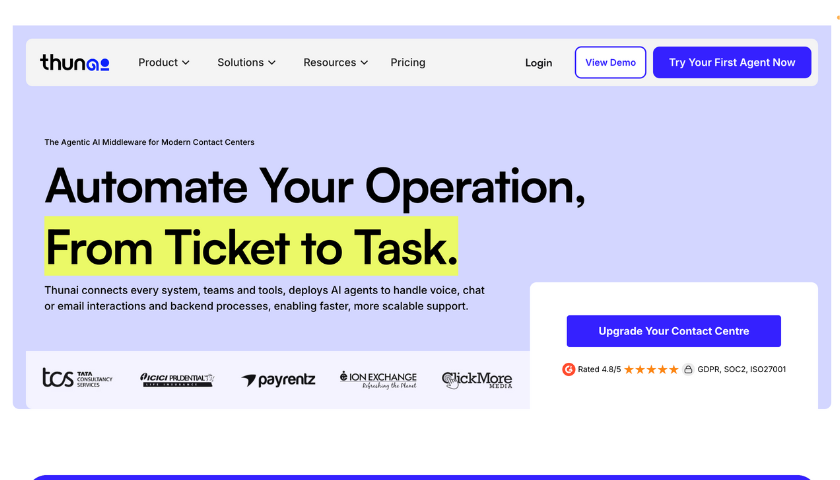
Thunai is an AI-native disruptor in the customer experience market. This enterprise AI software positions itself as a next-generation 'Agentic AI Platform' instead of a traditional contact center solution.
This enterprise cloud call center solution does this by building its entire architecture around an AI center designed for radical automation. With relation to it being a no code, easy-to-use platform that allows you deploy fully functional voice, chat, and email agents in minutes.
Other than this, you integrate Thunai with any existing contact center software you are using. Thunai also allows you to create your own AI voice agents that sound natural and can respond to queries based on the information you give them in over 150 languages.
Some major features that help enterprises include automated call audits and call metrics that you generate automatically without manual intervention for 100% QA on ALL calls.
Thunai is one of the best enterprise contact center solutions to work with right now, for its versatility and wide use cases that automate workflows completely.
Key Features of Thunai:
- Thunai Brain: This is a unique, self-learning knowledge hub. It takes in all of a company's data, for example, documents, videos, and chats (this can even include multiple scattered data or databases). It then puts that knowledge to use to power intelligent, autonomous agents.
- AI Agentic Suite: The system has a set of specialized AI agents for voice, chat, and email. The Voice Agent has 99.9% human-like conversation skills. The Voice Agent also supports over 150 languages.
- The Thunai Brain: The platform's main idea is an AI-based knowledge center. This knowledge center takes in and puts together all of a company's information. This creates a second brain for the business.
- AI Call Scoring and Audits: With AI call scoring, Thunai gives you a full call summary, sentiment analysis, and scores calls on parameters you can choose for your business for 100% QA. No need for any more limited random call auditing.
Pros:
- This enterprise contact center software is praised by early users for its impressive, human-like AI and efficiency.
- Its knowledge-based idea, the Thunai Brain, is a distinct and effective design.
- The platform gives business users the ability to use no-code automation tools.
- Support for over 150 languages is a major plus for global companies.
Cons:
- As a new product, it has limited documentation.
Pricing:
The starting tier is at $9/month. Paid tiers like the Basic plan start at $99 per month which goes down to $79 per month when billed annually, for unlimited agents.
2. Amazon Connect
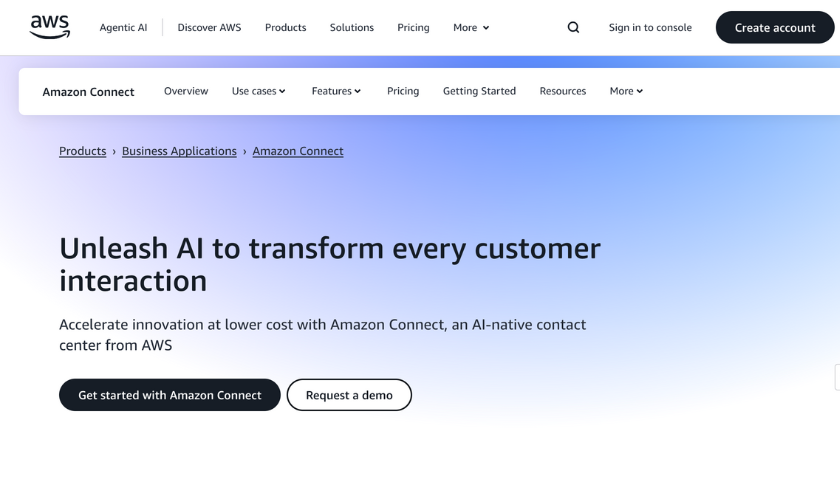
Amazon Connect was launched by AWS. Amazon Connect is a full cloud-based contact center. The system is built on the technology that runs Amazon's own worldwide customer service operations.
The system is presented as a highly expandable and developer-friendly platform. Amazon Connect is one of the enterprise contact center solutions known as a Leader in the market.
The platform's philosophy shows up in the Builder's Platform Dilemma as its biggest strength is its deep connection with the large AWS toolkit.
This is also its biggest operational challenge for companies that do not have a strong in-house development team
This is the best enterprise contact center software for companies with a strong AWS presence and in-house developers who want to build a highly customized contact center.
Key Features of Amazon Connect:
- Deep AWS Connection: Its main strength is its native link with AWS services. These include Amazon Lex for conversational AI, Lambda for serverless functions, and S3 for data storage.
- Amazon Q in Connect: This is a generative AI assistant. This assistant gives real-time, context-aware answers and suggested actions to agents during live talks.
- Contact Lens: This is a key feature. This feature gives conversational analytics using machine learning. This feature includes call transcription, sentiment analysis, and automatic contact sorting.
- Deep AWS Ecosystem Connection: This allows for almost unlimited customization. Companies can add functions using services like AWS Lambda, Amazon Kinesis, and Amazon Lex.
Pros:
- The system can handle very large and changing contact volumes. The system is built on the global AWS technical setup for consistent performance.
- The system gives great flexibility and customization for companies with the development staff to make custom experiences.
- The pay-as-you-go pricing gets rid of large initial costs and per-agent license fees. This makes the system financially appealing for businesses with shifting demand.
Cons:
- The system has a high technical entry barrier. The system needs a lot of in-house or partner technical skill to manage well.
- The system has fewer features out-of-the-box compared to more productized rivals. This is especially true in areas like Workforce Engagement Management (WEM).
- The detailed, usage-based pricing can make it hard to accurately predict monthly and yearly costs.
Pricing:
Amazon Connect operates on a pure pay-as-you-go basis. Costs are metered based on consumption. For example, it charges per minute for voice or per message for chat. All extra services, like Contact Lens analytics or S3 storage, are billed separately.
3. NICE CXone

NICE is a long-standing titan of the industry. Its flagship CCaaS platform, NICE CXone, is a feature-rich market leader.
One of the best enterprise cloud call center solutions, NICE CXone is built as a complete, cloud-native platform. Its main value is putting forward a powerful, reliable, all-in-one solution.
The platform has a special emphasis on its top-tier Workforce Engagement Management (WEM) functions, analytics, and AI.
This is the best enterprise contact center software for businesses that want a full, all-in-one platform with leading Workforce Engagement Management (WEM).
Key Features of NICE CXone:
- Workforce Engagement Management (WEM): This is a main strength of the platform. This feature has deeply connected tools for performance management, quality management, workforce management (scheduling and forecasting), and screen recording.
- AI and Automation: The suite has CXone Mpower Copilot for Agents. This gives real-time advice and knowledge suggestions to agents during live interactions.
- Omnichannel Routing: The platform has skills-based routing for a wide range of digital channels. This is taken care of through a visual, drag-and-drop tool called CXone Orchestrator.
Pros:
- The system has a full, all-in-one set of tools for routing, analytics, and workforce engagement. This lessens the need for third-party tools.
- The connected, top-tier WEM suite is a major point of difference. This is a main strength of the product.
- The platform is proven to be stable. The platform can support large, complex enterprise operations.
Cons:
- The most significant drawback is the price. In fact, CXone is considered expensive compared to alternatives.
- Its most powerful AI and WEM features are locked behind the highest-priced tiers. This forces businesses to commit to more expensive plans just to get access to them.
- The extensive capabilities can bring about a steep learning curve for new users.
Pricing:
Plans range from a digital-only agent at $71 per user per month up to the Complete Suite at $209 per user per month.
4. Genesys

Genesys is one of the most well-known leaders in the CX and contact center field. Its Genesys Cloud CX platform is presented as an all-in-one, AI-based system.
This system is designed to manage personalized, end-to-end customer journeys.
Genesys uses AI to link up and manage customer journeys across marketing, sales, and service. This is the best enterprise contact center solutions for businesses focused on customer-centered change and managing personalized, end-to-end customer journeys.
Key Features of Genesys:
- AI-Based Experience Orchestration: This is a top-market function for managing the whole customer lifecycle, not just single support talks. This lets businesses design, watch, and adjust customer journeys in real-time.
- Artificial Intelligence: The platform is filled with AI. This includes predictive engagement to guess customer needs. This also includes AI-based bots for self-help and agent-assist tools like Co-Pilot.
- Open Platform and Connections: The platform is very expandable. The platform has a large marketplace of third-party apps (AppFoundry). Genesys also has flexible APIs for custom connections.
Pros:
- Users overwhelmingly praise it for being a complete, forward-thinking, all-in-one solution.
- The quality of voice interactions and the intuitive 'Architect' tool for building IVR flows are pointed out as major strengths.
- The platform is highly regarded for its stability and scalability. Users also value the continuous addition of new features.
Cons:
- Some users feel the vendor could supply better and more up-to-date documentation and training. These materials would help them make use of the platform's vast capabilities.
- While generally positive, some users have brought up that support can be a challenge. In addition, the cost can be expensive for smaller companies.
Pricing:
Genesys uses a tiered, per-user, per-month subscription model. Plans go from CX 1 for voice-only at $75, to CX 2 for omnichannel at $115, up to CX 3 for WEM at $155.
5. Five9
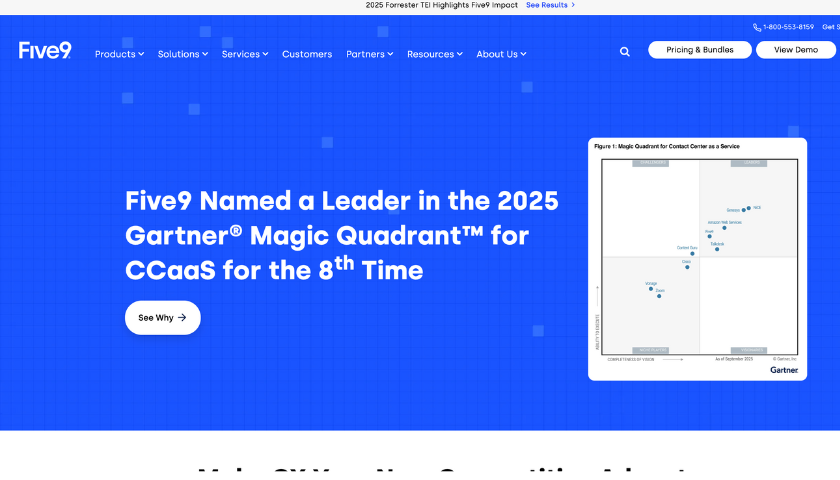
Five9 pioneered the cloud contact center concept by combining VoIP with a SaaS model.
The Five9 Intelligent CX Platform is a powerful end-to-end solution. One of the best enterprise contact center solutions, It combines practical AI, strong digital engagement, and solid workforce optimization tools.
The platform's market position comes from its solid technical setup. The platform also has a full feature set and a strong emphasis on practical AI and automation.
This is the top enterprise contact center solutions for companies with large outbound or mixed (inbound/outbound) calling needs.
Key Features of Five9:
- Outbound and Blended Functions: Five9 has historically strong functions for outbound and mixed campaigns. The system has multiple auto-dialer modes like predictive, progressive, and preview. The system also has campaign management tools.
- Practical AI and Automation: The platform includes Genius AI. This gives intelligent virtual agents (IVAs) and real-time agent help (Agent Assist). This also includes workflow automation.
- Strong CRM Connections: Five9 has pre-built connections. These connections are with leading CRM systems like Salesforce, Microsoft Dynamics, Zendesk, and Oracle.
Pros:
- Users frequently praise the platform's reliability. They point out that service outages are extremely rare.
- The powerful outbound dialer and user-friendly interface are seen as significant strengths.
- Support from dedicated account management teams is often described as top-notch and highly responsive.
Cons:
- While functional, some users may find the agent and admin screens less modern or easy-to-use compared to newer rivals.
- The standard reporting tools can be somewhat inflexible. Advanced customization often calls for professional services.
- While many users praise the support, a notable number bring up problems. This suggests some variation in service quality.
Pricing:
Five9 has tiered, per-user, per-month plans. the Digital plan are listed at $119 per user per month.
6. Zoom Contact Center

Zoom Building on its massive success in video conferencing, Zoom broke into the contact center market in 2022. Zoom Contact Center is an omnichannel solution deeply connected into the familiar Zoom ecosystem.
This top enterprise contact center solution’s main value is to humanize customer service through its best-in-class video capabilities.
The system is tightly linked to the familiar Zoom environment. This enterprise contact center solution's main value is simplicity and unity.
Zoom Contact Center allows a single application for meetings, phone, chat, and contact center calls.
This is the best enterprise contact center solutions for businesses already using the Zoom system that want to use video as a main customer interaction channel.
Key Features of Zoom Contact Center:
- Video-First Engagement: A key point of difference is the ability to easily move a chat or voice call to a video call in the same session. This is done using Zoom's main technology.
- Unified Agent Experience: Agents use the familiar Zoom client to deal with all contact center calls. This lessens the need for separate applications. This can also shorten training time.
- AI and Self-Service: The system includes a drag-and-drop IVR editor. The system also has AI-based features like Zoom Virtual Agent for chatbot and conversational IVR functions.
Pros:
- The system gives a single, familiar application for all internal and external communications. This simplifies the tech stack and user experience.
- Top-tier video functions are a strong and different channel for high-touch customer support.
- The easy-to-use interface is known to millions. This shortens agent training time and speeds up use by new people.
Cons:
- As a newer product, it is perceived as lacking some of the mature features of competitors. This is particularly true for advanced outbound dialing.
- Some users find the call flow editor to be overly complex, even with its drag-and-drop design.
- The pricing model is quote-based and add-on-heavy. This is a drawback for transparency.
- Its biggest strength is also a possible drawback for businesses not using the Zoom system for internal communications.
Pricing:
Zoom's pricing is quote-based and structured as an add-on. A base Zoom One plan is required first. This can make the total cost complex to work out.
7. 8x8 Contact Center

8x8 is a veteran of the communications industry and has a single, unified platform that combines UCaaS and CCaaS.
This enterprise contact center software combines Unified Communications (UCaaS) and Contact Center as a Service (CCaaS). Its main market difference is its ability to be a single, unified system for all of a company's communication needs.
This ranges from internal phone calls to external, omnichannel customer service. This is the top enterprise contact center solution for businesses wanting to combine and buy both their UCaaS and CCaaS systems from a single, connected vendor.
Key Features of 8x8 Contact Center:
- Connected XCaaS Platform: The system is a true single-vendor system for both UCaaS and CCaaS. This simplifies administration and improves teamwork between agents and other subject matter experts.
- Unified Agent Workspace: Agents use one screen, the 8x8 Work application. Agents use this to deal with both contact center talks and their internal UCaaS communications.
- Global Reach: The system has full Public Switched Telephone Network (PSTN) replacement in over 58 countries. This makes the system a strong choice for multinational companies.
Pros:
- A true single-vendor system for both UCaaS and CCaaS simplifies administration and improves teamwork.
- The system has full PSTN replacement in over 58 countries.
- Cost-saving bundled pricing plans can have great value for businesses needing both internal and external communication tools.
Cons:
- While complete, the contact center features might not have the same depth or specialization as standalone enterprise CCaaS leaders like Genesys or NICE.
- Some of the more advanced setup options can be complex. These may need a learning period for administrators.
- A small number of users report that the screen can feel busy or cluttered at times.
Pricing:
The X6 plan is the entry-level contact center option at $85 per user per month. The top-tier X8 plan, at $140 per user per month, includes the full feature set.
8. Webex Contact Center
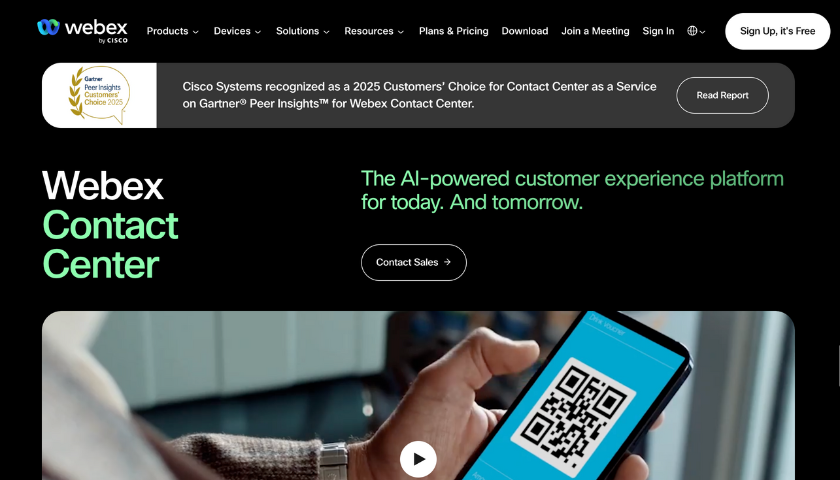
Webex is a titan in the collaboration and enterprise cloud call center space. This top contact center software puts to use decades of experience in enterprise communications, telephony, and security. It’s also worth mentioning that Webex Contact Center is an AI-powered, cloud platform.
The enterprise contact center solution uses the security and stability of the Cisco environment. Its key market point is its ability to give a unified experience.
This is done by deeply connecting the contact center with the collaboration tools that workers use every day.
This is the best enterprise contact center software for large businesses that already use the Cisco system and that value security, stability, and deep collaboration links.
Key Features of Webex Contact Center:
- Deep Collaboration Connection: Unmatched connection with the Webex suite makes teamwork between contact center agents and subject matter experts in the company smooth.
- Advanced AI Functions: The system has a strong set of AI-based tools for self-help and smart routing. This is one of the enterprise cloud call center solutions that also gives real-time agent help.
- Complete Omnichannel Support: The system is a solid and unified platform for managing customer talks across all major channels. These channels include voice, chat, email, and social media.
- Webex Control Hub: The entire solution is looked after through the Webex Control Hub. This gives a single pane of glass for the administration of the entire Webex Suite.
Pros:
- Users frequently praise the enterprise cloud call center solutions' reliability and stability. They also mention that this enterprise call center solution has excellent call quality, even under high traffic.
- The system uses Cisco's deep skill in networking to give a highly secure and stable platform.
- Deep connection with the Webex suite allows for smooth teamwork. This teamwork happens between the contact center and the rest of the business.
- The system has a strong set of AI-based tools for self-help, smart routing, and agent help.
Cons:
- The per-agent pricing model can be expensive. This may make it hard to grow cost-effectively for businesses with changing demand.
- The initial setup and connection process can be complex. The process may call for special expertise.
- Many user comments suggest that the speed and quality of customer support can be a problem.
Pricing:
Essential features like Workforce Optimization start at $40 per user per month
9. RingCentral Contact Center
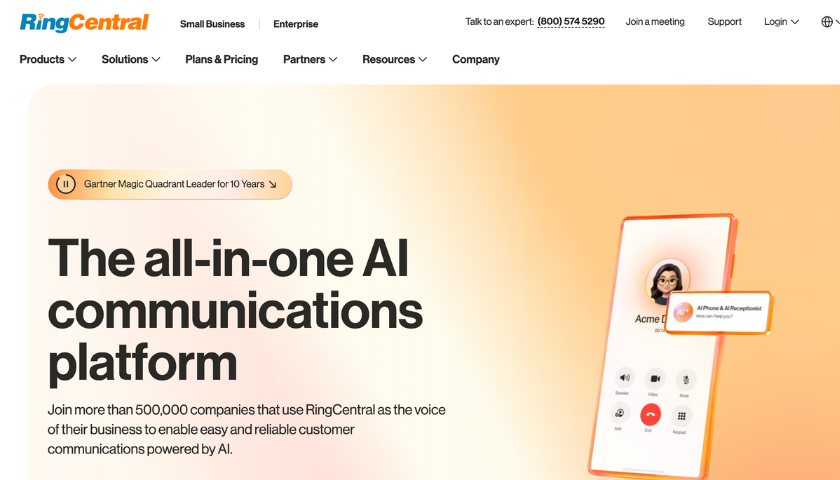
RingCentral is a big name in the UCaaS market. Its Contact Center is made to work smoothly with its main RingCentral MVP platform. The product is presented as a connected part of its larger business communications suite.
The main value of this top enterprise contact center solution is the ability to have a single, unified platform for both employee and customer communications for an enterprise cloud call center.
This is one of the best enterprise contact center solutions for businesses already using or planning to use RingCentral MVP for a single, dependable, and connected communications platform.
Key Features of RingCentral Contact Center:
- AI-Powered Experiences: The platform uses RingSense AI to supply intelligent functions. This includes real-time agent coaching, automated call summaries, sentiment analysis, and AI-powered virtual agents (chatbots) to handle routine customer questions.
- Broad Omnichannel Support: The system has one of the widest ranges of supported digital channels in the market. This lets agents talk with customers across more than 30 channels through a unified routing engine.
- Unified UCaaS and CCaaS: This is a top-market connected system. This system simplifies vendor management. The system also improves teamwork between agents and other employees.
- Strong Connection Ecosystem: The system gives solid, pre-built connections with a wide range of popular business applications. These applications include major CRMs like Salesforce and Zendesk.
Pros:
- A top-market connected system simplifies vendor management and improves teamwork.
- The enterprise cloud call center is known for its strong performance and high stability. This is very important for business communications.
- The platform has one of the widest ranges of supported digital channels in the market.
Cons:
- The back-end portal for administrators can be complex. The portal may need a lot of training to learn well.
- As a premium product, the total cost of ownership can be high. This is especially true for the top-level plans with all features turned on.
- While the analytics suite is good, users may find it needs a lot of time to learn how to build out custom reports and dashboards.
Pricing:
Pricing for RingCentral's contact center is based on a quote.
10. Microsoft Teams Phone
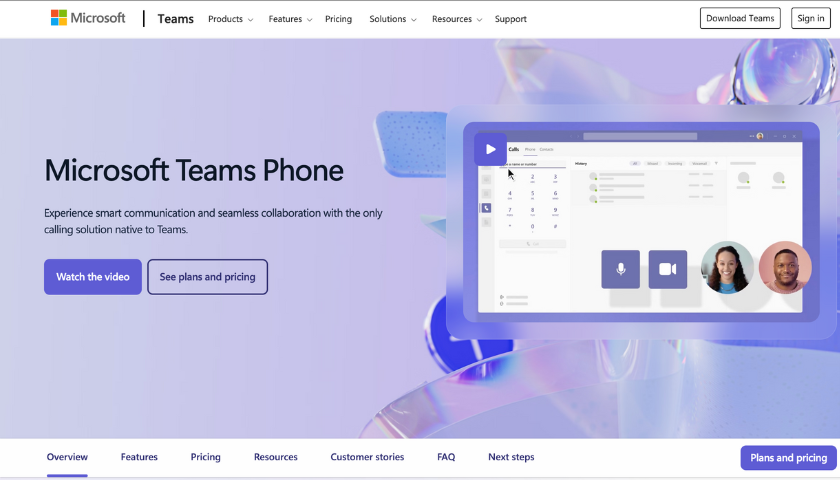
Teams Phone gives a complete set of cloud-based PBX functions. These include call control (hold, transfer), auto attendants, call queues, and voicemail.
This is not a standalone CCaaS product. This is the basic telephone layer inside the Microsoft 365 environment. Contact center functions can be built on this layer. Teams Phone’s value comes from its built-in connection to the Microsoft 365 suite.
This is an enterprise cloud call center used by hundreds of millions daily. Microsoft's plan is to give the main telephone service. Then, Microsoft works with special CCaaS vendors to add advanced features.
This is one of the top enterprise contact center solutions for companies deeply invested in the Microsoft 365 environment that need a base telephone layer for a partner-supplied CCaaS system.
Key Features of Microsoft Teams Phone:
- Built-in Microsoft 365 Connection: The system has an unmatched connection with the world's most popular business productivity suite. This gives a single, unified workspace inside the familiar Teams client.
- Third-Party Connection: Its most important feature is its ability to deeply connect with a wide range of certified CCaaS systems. These systems give their advanced agent desktops, routing engines, and AI functions directly inside the Teams screen.
- Basic Call Handling: Built-in features are limited to simple call handling. Examples are Call Queues and Auto Attendants for basic menu routing.
Pros:
- Users report that the service is dependable. Call quality is crisp and clear after setup.
- Its standout feature is the deep connection with Teams and the Microsoft 365 ecosystem. This creates a strong and unified place for teamwork. The availability of AI features through Copilot is also seen as a significant advantage.
Cons:
- The enterprise contact center solutions' pricing and setup processes are frequently described as excessively complex and expensive.
- Administrators may require specialized assistance to manage the licensing and configuration.
- The enterprise cloud call center also lacks its own advanced contact center features, like call barging. This requires businesses to depend on third-party products for those functions.
Pricing:
Varies based on number of users and usage.
Thunai Use Cases With Enterprise Contact Center Solutions
- Automated Inbound Calls: Thunai's voice bots can answer common customer questions 24/7. This allows human agents to work on more complex problems. The bots can also direct callers to the correct department based on their spoken request, acting as an intelligent front door for the contact center.
- Real-Time Agent Support: During a live call, Thunai can give agents real-time support. This includes live transcription of the conversation. In enterprise call center solutions, it also suggests answers to customer questions and helps with data entry into CRM systems. This supports better agent performance.
- Voice Agents With Screenshare: In cases where your customers have issues with websites or apps, your AI voice agents can guide your customers step-by-step. This removes the lack of guidance and goes around the issue of agent availability.
- True A2A Capability With Your Existing Tools: Our agents don't just work in isolation. Thunai now enables true Agent-to-Agent (A2A) communication, allowing our AI to autonomously collaborate with agents inside your enterprise call center solutions, CRM, ERP, and other critical software.
- Instant API and LLM Connection via MCP Layer: Deploying AI and agents is seamless. Thunai’s new Multi-agent Communication Protocol (MCP) layer allows you to instantly and securely connect your proprietary APIs and preferred Large Language Models.
- Post-Call Automation: After a call ends, Thunai automatically generates a summary of the conversation. This removes the need for agents to write manual notes and lowers their after-call work time with enterprise call center solutions
- Quality and Performance Analysis: The platform analyzes call recordings from enterprise call center solutions to check if agents followed scripts. It also measures customer sentiment. This gives managers information about team performance and training needs without manual review.
Work With Thunai: One of the Best Enterprise Contact Center Solutions
While we have gone over the best enterprise contact center solutions in this guide, Thunai stands out. It has an AI-native architecture designed for maximum automation and intelligence.
Our teams have used Thunai to redefine their support and sales workflows, and they saw results from Day 1.
Do you want to see how Thunai can change your customer experience?
You can set up a free demonstration to see its agentic AI in action.
Frequently Asked Questions About Enterprise AI Contact Center Solutions
How is AI used in contact centers?
AI is used to automate common and repetitive customer inquiries, such as answering frequently asked questions or managing appointments. It also intelligently routes complex issues to the correct human agent and can assist those agents in real-time by suggesting answers.
What are the best enterprise CCaaS providers?
Genesys, Nextiva, and 8x8 tend to be the more popular options when it comes to the best enterprise CCaaS providers. In terms of unifying your full enterprise contact center and customer interactions, however, Thunai is one of the most flexible and AI tools to work with.
What is the best call center software provider for small businesses?
RingCentral and OpenPhone are some good enterprise contact center solutions for smaller businesses. Twilio is also an option worth consideration.
What is the best on-premise contact center software?
Genesys Pure Connect is one of the better on-premises contact center software. However, it can get a bit pricey. Dialer360 is another option users consider for on-premise contact center software. In terms of automation, however, Thunai works for both cloud-based and on-premise software.
What is an AI tool for contact management?
An AI tool for contact management is a software application that uses artificial intelligence to handle and improve interactions with customers. These tools like Thunai often appear as conversational AI chatbots, voice assistants, or sophisticated analytics dashboards.
What is a contact center AI platform?
A contact center AI platform is a foundational technology system that supplies a suite of AI-powered services for customer communication. enterprise contact center solutions connect various channels like voice, chat, and email, using AI to manage workflows, analyze conversations, and automate tasks across the board.
What is the meaning of ECC in a call center?
ECC stands for Enterprise Contact Center. The 'enterprise' part signifies that the solution is designed for the scale, complexity, and strategic needs of a large company. Unlike a basic call center, an enterprise contact center solutions deeply with other business systems and handles a wide array of digital and voice channels
What is an enterprise contact?
An 'enterprise contact' can be understood as a single interaction that is part of a larger, more complex customer journey within a large company. Modern enterprise contact center solutions are designed to do more than just handle individual contacts. They also coordinate these end-to-end journeys.

